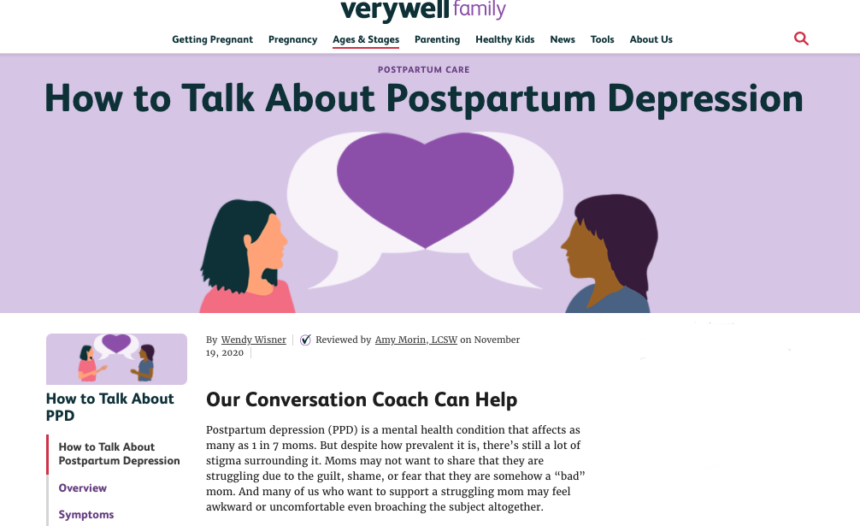Verywell Health launched its series of “Healthy Conversations” in April 2019, well before anyone had heard of COVID-19 or could know that a coronavirus would upend life around the world. Yet the content would prove especially timely in 2020, as difficult conversations around health-related topics have taken on additional layers of complexity. Social distancing has meant social isolation for many, making the challenges of navigating health concerns, often without our ordinary access to familiar resources, even more formidable.
The goal of the Healthy Conversations series has been to allow Verywell visitors to role-play difficult health-related conversations prior to attempting them in real life with family and friends. Topics covered by the 10 installments created to date have ranged from anti-vaccine sentiments to postpartum depression – the subject of the most recent one, which launches on Tuesday. Each interactive dialogue is accompanied by articles, doctor/patient guide and other relevant information.
“The Healthy Conversations tools are focused on topics where one article doesn’t do it justice,” explained Verywell GM Rachel Berman. “A story like ‘Ten Things You Should Say to Someone Who Gets a Cancer Diagnosis’ isn’t enough, because often people might say the wrong thing or something that is insensitive. We want to make sure the tool provides context and notifies the reader about how something might not be the most productive way to have a conversation.”
Trending searches on Verywell this spring were an early indication that there might be a need for conversations around postpartum depression, the first of the Healthy Conversations to focus on a mental-health topic. “Our searches for ‘pregnancy tests’ went up early on in the pandemic and more moms were looking for information related to the first trimester of pregnancy,” said Verywell Mind editor in chief Amy Morin.
Berman stressed, however, that Verywell isn’t forecasting a pandemic-related baby boom. “We are not predicting that, but it does appear that people were, and are, turning more to online resources.” She noted that, according to the Centers for Disease Control and Prevention, rates of depression have tripled during the coronavirus.
Complicating PPD in some cases is that mothers who may currently be experiencing symptoms went without any of the typical pregnancy-related celebrations with family and friends, like baby showers. Along those lines, with COVID rates rising once anew, they cannot attend classes or see relatives without assuming some degree of risk.
“People are more isolated and it might take longer for loved ones to recognize that people are struggling,” Berman said. “And then it can be harder for mothers to ask for help when they are not face-to-face with their doctors or friends.”
For her part, Morin noted that the increase in communication via text messages and video calls may have some advantages when it comes to having the difficult talks that Healthy Conversations encourages. “Some people like to have that moment [with a text message] of not feeling under pressure to reply immediately. You can take a little more time to craft a response if you don’t know what to say,” she explained, noting that users can “take a minute and look back at our Healthy Conversations and say, ‘Okay, here is the next thing I might want to say’ or ‘Here’s another point I might want to address.’”
Morin believes that Healthy Conversations can make it easier for people who need some help to take the next step. “If you know a mom who you think is struggling, you can point her to online therapy… We have done some research on that as well and found that 90% of the people on our site who go on to use online therapy view the decision to seek help as a sign of strength.”
For an April 2024 article on femtech Elvie highlighting postpartum issues with a Times Square billboard, click here.







